New Delhi, May 19: The fact that obesity is a step toward long term health problems is not unknown.
 It can negatively affect most of your organs – especially the heart – make you vulnerable to diabetes, joint pains, arthritis, make it difficult for women during pregnancy – basically, impact your overall health.
It can negatively affect most of your organs – especially the heart – make you vulnerable to diabetes, joint pains, arthritis, make it difficult for women during pregnancy – basically, impact your overall health.
Obesity is one of the biggest problems at present, that is rapidly becoming a part of everyone's life. The rising number of obese people around the world just goes to show how we are allowing a particular lifestyle to dictate us into an unhealthy state of being.
Of course, various diets along with a regular, suitable exercise regimen can help you shed the kilos, however, a study has discovered that a conscious decision of making a lot of healthy fruits and vegetables a part of your daily diet can help curb obesity risk.
Pro-vegetarian diets (with a higher consumption of plant-based foods compared to animal-based foods) could provide substantial protection against obesity, according to the University of Navarra research presented at this year's European Congress on Obesity (ECO) in Porto, Portugal (17-20 May).
This observational study found that people who ate a high pro-vegetarian diet, rich in food coming from plant sources like vegetables, fruit, and grains, cut their risk of developing obesity by almost half compared to those who were least pro-vegetarian, with a dietary pattern rich in animal food like meat, and animal fats.
Current evidence suggests that such a pro-vegetarian diet has a protective role in cardiovascular disease and diabetes, but little is known about its role on the risk of developing obesity in healthy populations.
The study was carried by student Julen Sanz examined the association between varying degrees of pro-vegetarian (plant-based) diet and the incidence of obesity in over 16,000 healthy, non-obese adults from the SUN Cohort (Seguimiento Universidad de Navarra), a study tracking the health of Spanish graduates since 1999.
The authors acknowledge that their findings show observational differences rather than evidence of cause and effect. They conclude: "Our study suggests that plant-based diets are associated with substantially lower risk of developing obesity. This supports current recommendations to shift to diets rich in plant foods, with lower intake of animal foods."







Comments
Add new comment